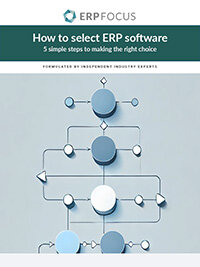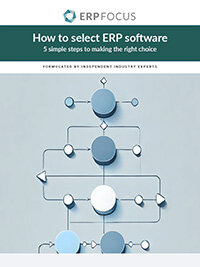4 ways ERP can help your sales department
We are all well aware that ERP offers a host of values to enterprise managers, however, at the front-end of the value chain the sales department are in a unique position to reap the rewards of the system. This is primarily due to the department’s position as the most outward facing element within a transaction process. The better the sales department performs in the field, the better the entire enterprise will perform on the bottom-line over time.
1. Increase “right message, right time” information delivery
All efficient sales processes are largely driven by the speed of outreach guided by the depth of penetration of one or more market segments. These guideposts are also supported by the depth of information delivered at right time in the right place.
Recommended reading: ERP selection survival guide - 10 steps to success
Given the complexities of today’s commercial environment, sales departments without an efficient and timely sales ERP module can easily lose sight of opportunities and lose sales due to a lack of situational awareness in the market; they will simply be doing the wrong things, at the wrong time, too frequently.
2. Triggered communication for relationship milestones
Success in sales is largely a matter of relationship-building. It doesn’t matter if a salesperson is selling brown shoes, black shoes, or glow-in-the-dark widgets, enterprise transactions only blossom once a customer feels comfortable enough with the sales team.
Given the complexities of today’s commercial environment, sales departments without an efficient and timely sales ERP module can easily lose sight of opportunities
Constant communication is paramount since any business relationship will flounder if the salesperson is so uncommunicative that the customer barely known his/her name. In the case of ERP, there is really nothing better than an integrated CRM database that tracks customer information and triggers relationship milestones month by month.
3. Streamlined ordering
Among the many advantages offered by today’s sales ERP modules an ability to quickly configure and trigger an order has to be right at the top of the list. There is nothing worse than the lag time typically experienced by traditional ordering and transaction processes.
4. Measuring and delivering key performance metrics
Sales success is primarily derived by key performance metrics - such as win rate per rep or open opportunities per rep - that populate one or more targeted reports, providing a sales department with a clear understanding of an enterprise’s state of play on a daily, weekly, monthly and quarterly basis.
In the same way that ERP offers deep record keeping associated with customer lists, relationship traits and milestones, an ability to measure and deliver these key performance metrics on a recurrent basis can easily make the commercial difference between winning and losing.
Whether it is efficient sale list building and management; reduction of errors in communication; better customer relationship support; streamlined ordering, or the advantage of highly-granular sales metrics, sales ERP offers enhancements to traditional customer service processes. These fundamentals have the potential to increase performance at the sales level and ultimately on the bottom line.
Free white paper

How to Select ERP
Learn to select your ERP in 5 easy steps by following our expert's advice



